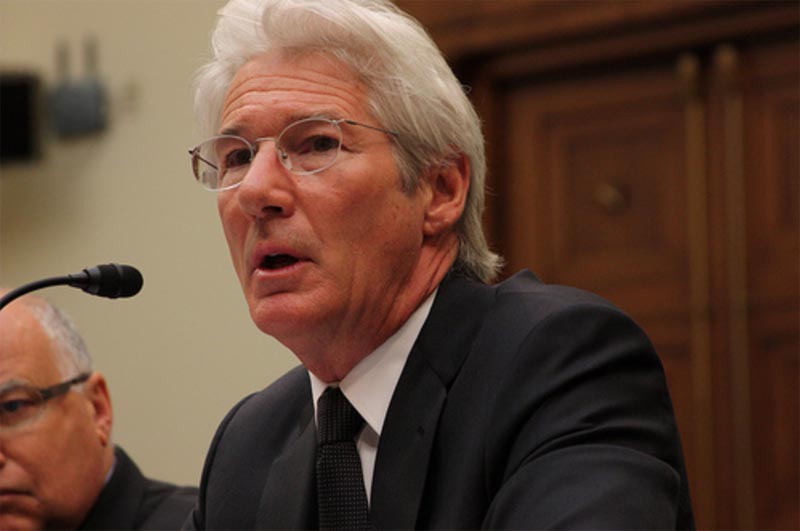 Dharamshala: During a hearing in the U.S. House of Congress on religious freedom, democracy and human rights in Asia on June 2, celebrity actor and chairman of the Board of Directors for the International Campaign for Tibet (ICT), Richard Gere, gave testimony before the House Foreign Affairs Committee on the status of implementation of the Tibetan Policy Act (TPA). The hearing also included two other acts on Burma and North Korea.
Dharamshala: During a hearing in the U.S. House of Congress on religious freedom, democracy and human rights in Asia on June 2, celebrity actor and chairman of the Board of Directors for the International Campaign for Tibet (ICT), Richard Gere, gave testimony before the House Foreign Affairs Committee on the status of implementation of the Tibetan Policy Act (TPA). The hearing also included two other acts on Burma and North Korea.
Chairman of the House Foreign Affairs Committee, Ileana Ros-Lehtinen, opened the hearing stating that, "today, we are here to discuss the dark clouds of oppression that hang ever heavier over the peoples of Tibet, Burma, and North Korea".
Representing the world's largest Tibet-related NGO, the more than 400.000 member strong ICT, Richard Gere then gave the committee a lengthy and thorough speech, assessing the progress on a range of critical issues.
These included the booming migration of ethnic Han-Chinese to Tibet, the Dalai Lama's devolvement of political power, the current Chinese crack-down on Kirti monastery in the Tibetan province of Ngaba, the problem of political prisoners in Tibet, the question of the missing Panchen Lama and the recently intensified persecution of Chinese dissidents in China.
Pointing to the TPA's directives for establishing a U.S. consulate in Lhasa, Gere said it should be "moved to the top of the priority list". This statement was backed by chairman Ros-Lehtinen who said that, "since 2002, when the 'Tibetan Policy Act' first called for the establishment of a U.S. official presence in the capital of Tibet, there has been absolutely zero diplomatic progress".
Adding to that, Ros-Lehtinen said that "The State Department must make it perfectly clear to China's diplomats that there will be no more Chinese consulates opened in the U.S. (...) until the stars and stripes are flying proudly over a U.S. diplomatic facility in Tibet.
Noting that he was "no stranger to Capitol Hill" Gere reiterated his views that "the cycle of uprising and repression will continue in Tibet unless China deals with the legitimate underlying grievances of the Tibetan people" and added that "this is as clear today as it was in 1959".
However, he also said that the ICT has never given up on the belief that Tibet can be saved with nonviolent resolution and that with the internal pressures that are mounting within the core of Chinese society there is presently an extraordinary opportunity to resolve the issue of Tibet.
In his closing remarks, Richard Gere urged the Committee to "find adequate time for discussions with His Holiness, His Representatives and Prime Minister-elect, Dr. Lobsang Sangay", referring to their coming 10-day Washington visit in July this year.
A major piece of legislation on Tibet, the TPA was signed into law in 2002 and reaffirmed in 2008 with an overwhelming vote of 413-1. While it recognizes Tibet as an occupied nation, it is decisively pragmatic in its encouragement of a negotiated agreement between China and Tibet.
This was underlined by Gere: I?m certain [there is] a genuine and heartfelt understanding among world leaders of what is at stake here. Most of them have met His Holiness and (...) recognize that the Dalai Lama?s position - genuine autonomy within the People's Republic of China is attainable and win-win for all players involved."
Both Gere and Ros-Lehtinen expressed their regrets that Maria Otero, the Special Coordinator for Tibetan Issues, a position created by the Tibetan Policy Act, could not appear as a witness, Gere noting that "she has not yet publicly testified on Tibet".


![Tibet has a rich history as a sovereign nation until the 1950s when it was invaded by China. [Photo: File]](/images/stories/Pics-2024/March/Tibet-Nation-1940s.jpg#joomlaImage://local-images/stories/Pics-2024/March/Tibet-Nation-1940s.jpg?width=1489&height=878)















